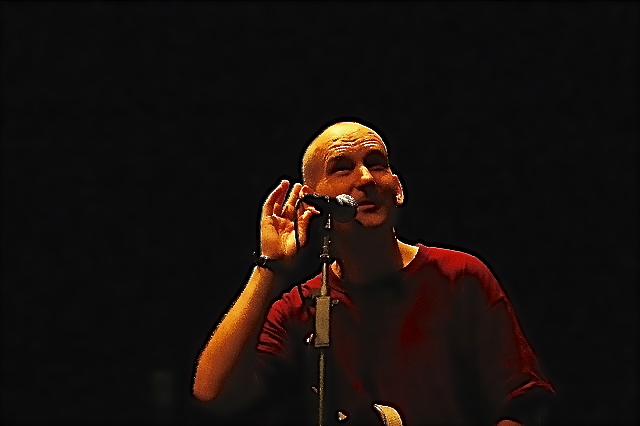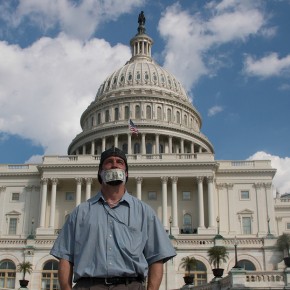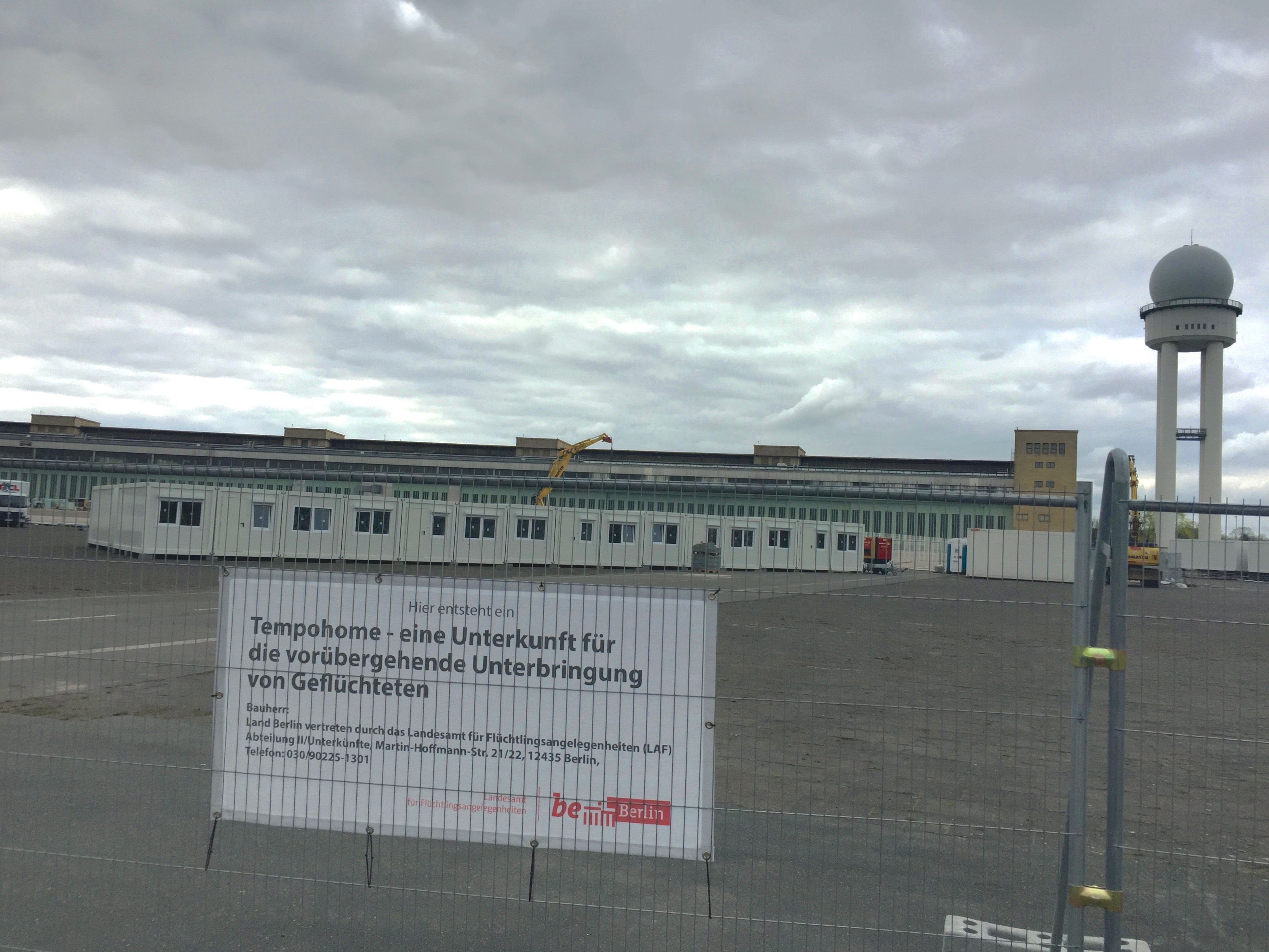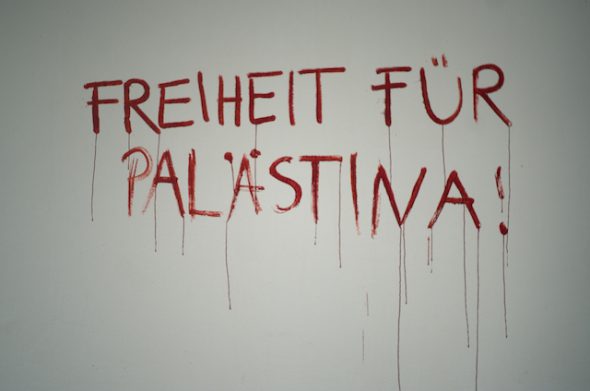Death was everywhere. A large, jovial Calaveras print greeted gig goers at the entrance to Sacramento’s Sol Collective – a reminder that Dia De Muertos is approaching. Sitting on the floor, I could see the dimly lit St. Joseph’s Cemetery across the street. A painting of a skull, tucked into a deep-sea diving mask, hung above Amy Farina’s drum set.
Of course, we were also citizens governed by a half-dead US government during the federal shutdown’s first night.
“How’s that government shutdown going for you?” Ian MacKaye, a fifth-generation Washingtonian, asked the crowd later that night. “Anarchy is disappointing,” a deadpan voice replied, drawing laughter. The band then played, “Wanted Criminals,” a satirical piece that imagines a government turning the unemployed into police officers – who then seek criminals to arrest out of boredom.
However, the Calaveras got to me. I thought of the sugar skulls made for the Mexican holiday that celebrates the love and merriment of deceased friends and family. I anticipated The Evens’ concert to be a Dia De Muretos-style punk revival before the music began. “Scratch any cynic and you will find a disappointed idealist,” comedian George Carlin famously argued. I hoped to bypass my 15 years’ worth of disappointments in believing that punk music was a vital force of cultural evolution and enlightenment. So many clichés, petty squabbles over punk credibility and authenticity, and political infighting had discouraged me from attending many punk shows for nearly a decade.
A promise that drew me to the The Evens on Oct. 1 was punk’s Calaveras or a return to what I considered to be punk’s skeletal core values of defying clichés and orthodoxy, and challenging listeners. MacKaye and Farina’s previous work in Fugazi and The Warmers often met those values, whether it be the former redefining what hardcore could be or the latter using rigid, machine grooves to barely conceal frontman Alec MacKaye’s rage.

My expectation was again fulfilled when the husband-and-wife duo played an early evening set between two living room lamps. MacKaye called upon everyone to flip pessimism on its back. “It’s all downhill from here,” was a lyric that he told them to keep to heart in making the best out of a present moment before his band played, “Shelter Two.” He added, “Every moment is a candidate for an elevated place.”
The Evens belied their minimalist setup that night. Distortion and feedback were unnecessary for MacKaye’s guitarwork. His electro-acoustic baritone guitar internalized the chaos, frustration, and the demands for transcendence that come from living in his nation’s capitol. He often hunched over into a trance while strumming so rapidly that his chords reminded me of tires skittering over an old bridge’s rusted metal slats.
During the middle of The Evens’ signature song, “Cut From the Cloth,” MacKaye’s solo sharply veered from graceful Wes Montgomery-like tones to bursts of street barricade-shattering dissonance that resonated in the gallery. The humming from a nearby soda machine thickened the tension during his rests. Farina’s percussion on a simple, four-piece Ludwig perfectly fit her husband’s bustle through roiling midtempo rhythms that often tossed about like barrels in storm-swept ships, as best heard in the instrumental, “Wonder Why.” Her vocals had a low-key, folksy presence that caused one to lean forward to hear intriguing lines like “If you want to catch a butterfly, just hold your finger still,” or “Your cache is empty because your body’s that way.” MacKaye’s voice was the spearpoint that barely contained the fire, even while he whispered. Whenever, the anger took court, his eyes darted to every pair before him while his brows arched wide; it was the same goddamn glare that helped give Minor Threat a name onstage.
While I was refreshed to see punk so imbued with life that night, there was a moment that first seemed encouraging but left gave me a sad impression. The band halted “Cut from the Cloth” and MacKaye told everyone that one of punk’s virtues was collective participation at concerts. He asked them to overcome their shyness to sing the song title while the band finished the song. Perhaps it was the concert’s intimate setting in a gallery or the MacKaye’s acoustic guitar that projected the message, “Sit still, it’s folk music.” It was interesting to see how such environmental cues had subdued so many listeners into closing their eyes, no matter how much MacKaye urged them to sing. He seemed to be like a schoolteacher on a piano trying to lead young children. For many years, I romanticized punk to an art of leaderless resistance.
Death came to the fore before the concert ended. MacKaye took a break to tell the crowd about the robotic U.S. drones that terrorizes an entire generation of children in Pakistan while hunting the “evildoers” – all paid by US taxpayers. The Evens then performed, “Architects Sleep,” a piece about military strategists who are disconnected from the many lives they ended. “And the architects are wide awake/Trying to forget their mistakes,” they sang. I ignored the smiling Calaveras when I walked out of Sol Collective. My eyes caught the silhouettes of St. Joseph’s tombstones across the street, faintly lit by passing traffic.
Photographs courtesy of Sampaist and Stephen Melkisethian. Published under a Creative Commons license.





